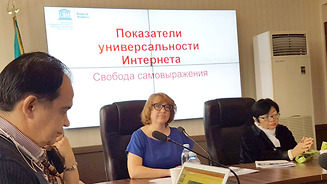2 March 2018
On March 2, 2018, at 10.00, Journalism and Translation Chair of the Turan university organized the second republican conference "Information Field of Modern Kazakhstan: Practices and Effects". UNESCO Almaty Office participated in the event.
UNESCO Internet universality indicators: accessibility and freedom of expression were presented to 50 participants: teachers, journalists, young researchers, undergraduates and students of participating universities.UNESCO launched its concept of Internet Universality in 2013. This concept, which was endorsed by UNESCO’s General Conference in 2015, embraces four principles which have been and should continue to be fundamental to the development of the Internet and its role in advancing the world’s Sustainable Development Goals (SDGs). These are the following principles: R - that the Internet is based on human Rights; O – that it is Open; A – that it should be Accessible to all; M – that it is nurtured by Multi-stakeholder participation.
At the end of the presentation, discussion on the UNESCO document took place, where the participants discussed in detail on guarantees of freedom of expression, transparency of restrictions, censorship, responsibility for online content, public participation in filling the Internet, and accessibility of online services for expression opinions.
Gender root causes in freedom of expression, stereotypes in media content, including online, as well as its accessibility for women bloggers.
Apart Freedom of expression on the Internet, other topics are discussed during the conference:
- Kazakhstani media: processes, contexts and content
- Civil journalism and journalism of social action
- Domestic electronic media in the media: problems of increasing efficiency
- Trends in the changing media systems under digitalization conditions
- Media language of modern media.
- Media Convergence: Forecasts and Prospects
- Mechanisms of self-regulation of editorial offices
- Media design of reality
- Capacity development in media and information literacy
- Sociocultural paradigm of new media.
- News reporting as a factor in shaping public opinion
- International and inter-ethnic integration processes in the development of the Kazakhstan information space.
Permanent link: http://en.unesco.kz/media-scene-of-kazakhstan-practices-and-effects

